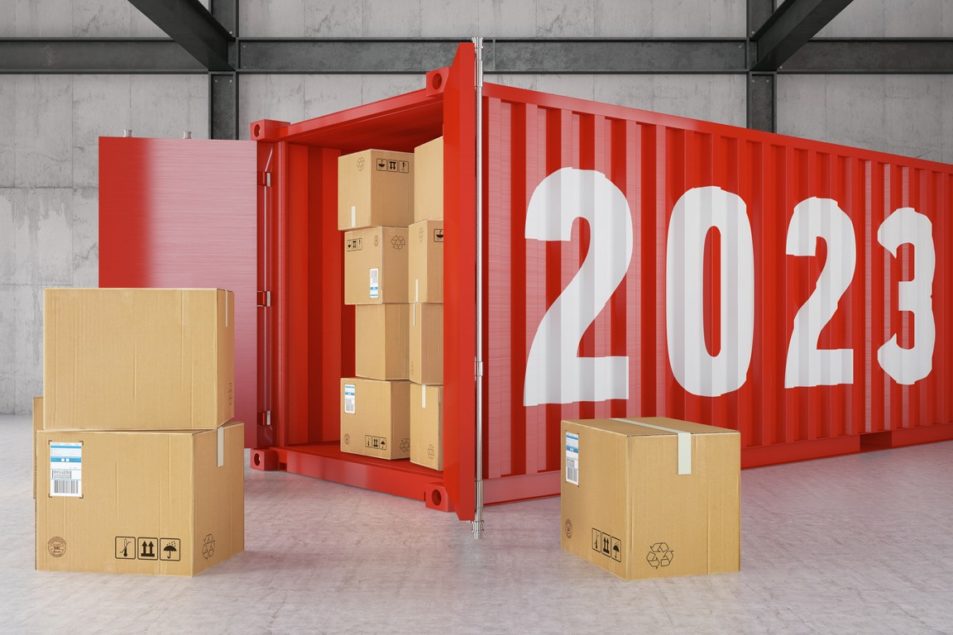
As 2022 drew to a close, the holiday shopping season was shaping up to look quite different from that of the prior two years, with greater availability of supply, improved accessibility and fewer orders. But the new year is sure to bring new challenges for logistics providers and retailers. Following are four thoughts on what the industry can expect to see in 2023.
Staffing will present the biggest challenge to supply chains. If the long tail of the pandemic has shown us anything, it’s the growing need for talent. The U.S. trucking industry reports being 80,000 drivers short of meeting demand, a problem that’s bound to get worse before it gets better. Staffing shortages have even affected auxiliary services to the supply chain, including insurance.
The question of how to create a culture that attracts people to the industry is hanging in the air. Emerging tech, recession-related unemployment and a push for employee engagement focusing on career growth are all forces that may combine in 2023 to give an answer.
Automation will continue to be an industry focus. Self-driving trucks may still be a thing of the future, but vendors, suppliers and operators are paying more attention to the technology that’s available now, and promises straightforward implementation with scalable results. Artificial intelligence-powered tools, including machine learning, offer insights into real-time reporting, and can even identify and predict supply chain disasters before they form.
One solution in the works lies in the industry’s push to go paperless. The current process of moving cargo within the chain is incredibly paper-intensive. Making all records electronic would not only save on costs, but (of course) solve mounting issues with paper supply. Technology and risk-management teams are eyeing the blockchain as a means of digital record-keeping. It promises transparency by creating an immutable record of transactions that’s viewable by all parties.
Mega-retailers will expand vertically into cargo transport. In 2022, we saw Amazon.com and Walmart charter their own ships in an effort to skirt supply chain delays. With the continuing high cost of shipping services, and ongoing complexity at the local level tied to staffing and leasing, we can expect these distribution giants (with notably deep pockets) to continue doing whatever it takes to move goods through the supply chain and into end users’ hands seamlessly. That now includes commissioning their own fleets — a surprising vertical move into cargo transportation.
Air transport will receive a bump in utilization, as port operators tackle capacity issues. One of the biggest bottlenecks in supply chain is at the marine port. Port capacity remains a challenge, but things are changing, albeit slowly. President Biden recently worked with officials in California to increase hours of operation at the ports. Container prices are coming down, as demand for goods slackens and a backlog of orders is finally cleared out. Meanwhile, distributors are looking at alternatives to the congested ports of Los Angeles and Long Beach, such as New Orleans, Savannah and Charleston.
There are, however, other ways to bring cargo into the U.S. An uptick in air transportation and airport utilization signals that manufacturers are willing to pay the price to keep the flow of parts and products uninterrupted. We see this mostly with high-value cargo that’s sensitive to damage, such as pharmaceuticals, computers, microchips for automobiles, jet engines, MRI equipment and high-value seasonal items. With consumers inclined to buy from sellers that can fulfill orders on demand, the choice to prioritize certain items for air transport is a trend that’s likely to continue.
Staffing, automation, port capacity and the rising cost of moving cargo are all challenges weighing on the supply chain industry. In many ways, a recession would ease these lags; the problems would essentially solve themselves. But for the long-term, neither a recession nor a miracle is needed. Strategic investment in people, technology and infrastructure is a sure bet for smoother sailing in supply chains in the coming year.
Ronnie Adcock is senior vice president, and Darin N. Miller is national marine manager, with Sedgwick.
- SEO Powered Content & PR Distribution. Get Amplified Today.
- Platoblockchain. Web3 Metaverse Intelligence. Knowledge Amplified. Access Here.
- Source: https://www.supplychainbrain.com/blogs/1-think-tank/post/36214-in-2023-staffing-shortages-will-remain-a-flash-point-for-supply-chains
- 000
- 2022
- a
- accessibility
- AIR
- Air transport
- airport
- All
- alternatives
- Amazon
- Amazon.com
- and
- and infrastructure
- Angeles
- answer
- artificial
- attention
- Attracts
- Automation
- automobiles
- availability
- available
- Beach
- before
- being
- Bet
- Better
- biden
- Biggest
- blockchain
- bring
- buy
- california
- Capacity
- Career
- Cargo
- certain
- chain
- chains
- challenge
- challenges
- changing
- choice
- Close
- COM
- combine
- coming
- complexity
- computers
- Consumers
- Container
- continue
- continuing
- Cost
- Costs
- course
- create
- Creating
- Culture
- Current
- deep
- delays
- Demand
- different
- digital
- disasters
- distribution
- doing
- down
- drivers
- effort
- Electronic
- emerging
- Employee
- engagement
- Engines
- equipment
- essentially
- Even
- Expand
- expect
- Finally
- Flash
- flow
- Focus
- focusing
- following
- Forces
- form
- from
- Fulfill
- future
- get
- Give
- Go
- goods
- greater
- Growing
- Growth
- Hands
- High
- Holiday
- HOURS
- How
- How To
- However
- HTTPS
- identify
- immutable
- implementation
- improved
- in
- Inclined
- includes
- Including
- Increase
- incredibly
- industry
- Industry Reports
- industry’s
- Infrastructure
- insights
- insurance
- investment
- issues
- IT
- items
- Keep
- learning
- leasing
- Level
- likely
- local
- logistics
- Long
- long-term
- Look
- looking
- los
- Los Angeles
- machine
- machine learning
- Making
- manager
- Manufacturers
- many
- means
- Meanwhile
- meeting
- Miller
- more
- move
- moving
- MRI
- National
- Need
- needed
- Neither
- New
- New Orleans
- new year
- notably
- offer
- ongoing
- operation
- operators
- orders
- Other
- own
- pandemic
- Paper
- parties
- parts
- Pay
- paying
- People
- pharmaceuticals
- plato
- Plato Data Intelligence
- PlatoData
- pockets
- Point
- ports
- predict
- present
- president
- president biden
- price
- Prices
- Prior
- Prioritize
- Problem
- problems
- process
- Products
- promises
- providers
- Push
- question
- real-time
- receive
- recently
- recession
- record
- record-keeping
- records
- remain
- remains
- Reporting
- Reports
- Results
- retailers
- rising
- sailing
- Save
- scalable
- seamlessly
- Season
- Sellers
- sensitive
- Services
- shaping
- Shipping
- ships
- Shopping
- Short
- shortages
- shown
- signals
- Slowly
- smoother
- solution
- SOLVE
- staffing
- Still
- straightforward
- Strategic
- STRATEGIC INVESTMENT
- such
- suppliers
- supply
- supply chain
- Supply chains
- surprising
- takes
- Talent
- teams
- tech
- Technology
- The
- The Future
- their
- themselves
- thing
- things
- Through
- Tied
- to
- tools
- Transactions
- transport
- transportation
- Trend
- Trucking
- Trucks
- u.s.
- unemployment
- us
- vendors
- Vice President
- Walmart
- ways
- weighing
- What
- will
- willing
- within
- worked
- works
- would
- year
- years
- zephyrnet












